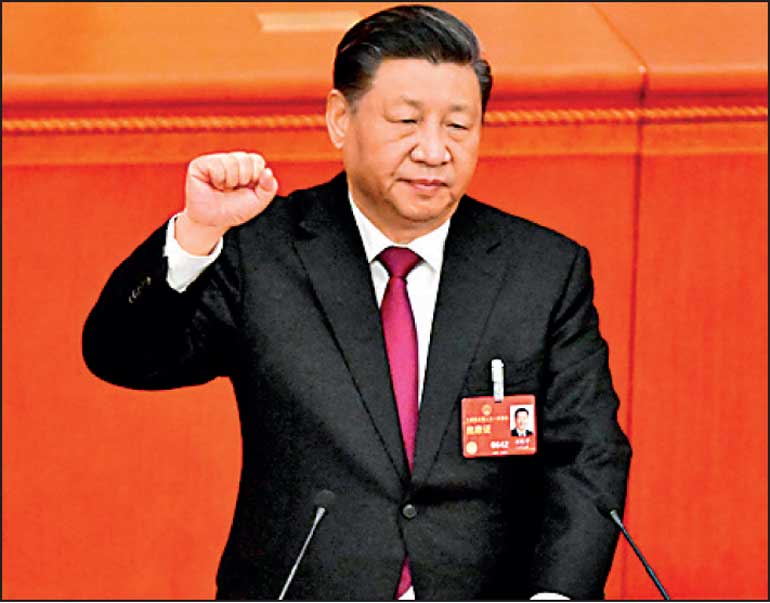Wednesday Feb 18, 2026
Wednesday Feb 18, 2026
Saturday, 11 March 2023 00:56 - - {{hitsCtrl.values.hits}}

China’s President Xi Jinping swears under oath after being re-elected as President for a third term during the third plenary session of the National People’s Congress (NPC) at the Great Hall of the People in Beijing on 10 March – AFP
BEIJING, AFP: Xi Jinping was handed a third term as Chinese President on Friday, capping a rise that has seen him become the country’s most powerful leader in generations.
His appointment by China’s rubber-stamp Parliament comes after Xi locked in another five years as head of the Chinese Communist Party (CCP) in October.
Since then, the 69-year-old has weathered widespread protests over his zero-Covid policy and the deaths of countless people after its abandonment.
But those issues have been avoided at this week’s National People’s Congress (NPC), a carefully choreographed event that is also set to appoint Xi ally Li Qiang as the new premier.
On Friday, delegates handed Xi a third term as President and re-appointed him Head of the country’s Central Military Commission in a unanimous vote.
Beijing’s Great Hall of the People, a cavernous State building on the edge of Tiananmen Square, was adorned with crimson carpets and banners for the landmark vote, with a military band providing background music.
A digital monitor on the edge of the stage proclaimed the final tally – all 2,952 votes had been cast in favour of giving Xi another term in office.
The announcement was followed by delegates’ fervent declarations of allegiance to the Chinese Constitution, in a demonstration of loyalty and unanimity.
Xi held up his right fist and placed his left hand on a red, leather-bound copy of China’s Constitution.
In an oath beamed live on State television, he vowed to “build a prosperous, strong, democratic, civilised, harmonious and great modern socialist country”.
China’s close ally Russia swiftly offered Xi its “sincere congratulations” on his re-election.
Also on Friday Wang Huning, a close Xi ally known for his prowess in ideological theory, was elected Chairman of the Chinese People’s Political Consultative Conference.
The non-legislative advisory body elected 23 Vice Chairpersons, including former Vice Premier Hu Chunhua.
Hu, a 59-year-old protege of Xi’s predecessor Hu Jintao, lost his spot on the CCP Politburo last October.
Xi’s re-election is the culmination of a remarkable rise in which he has gone from being a little-known party apparatchik to the leader of a rising global power.
His coronation sets him up to become communist China’s longest-serving President, and means Xi could rule well into his seventies if no challenger emerges.
Xi’s bold ambitions for the country have translated into a domineering leadership style, with decisions reinforced by loyalists that have risen to top Government positions during his decade at the helm.
And having taken power during a time when the CCP’s sway seemed to be wavering, he has worked hard to reverse trends that had threatened to weaken its centrality to Chinese society.
For decades, China – scarred by the dictatorial reign and cult of personality of founding leader Mao Zedong – eschewed one-man rule in favour of a more consensus-based, but still autocratic, leadership.
That model imposed term limits on the presidency, with Xi’s predecessors Jiang Zemin and Hu Jintao relinquishing power after 10 years in office.
Xi has torn up that rule book, abolishing term limits in 2018 and allowing a cult of personality to foster his all-powerful leadership.
But the beginning of his unprecedented third term comes as the world’s second-largest economy faces major headwinds, from slowing growth and a troubled real estate sector to a declining birth rate.